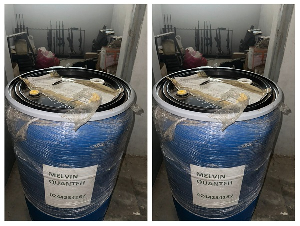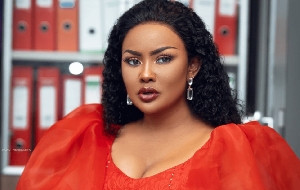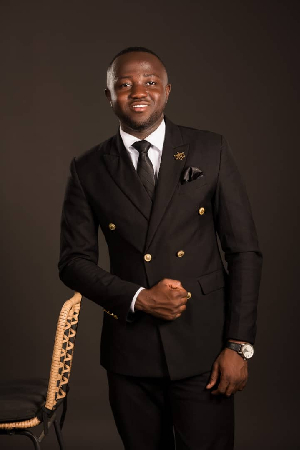Basketball of Sunday, 12 November 2006
Source: joshua motenko (motenko.scout at gmail.com)
Bawa Maniru and his NBA dream
I was standing on the sidelines of the IUPUI gymnasium in Indianapolis, Indiana waiting for Nike?s All America Camp 3-on-3 tournament to begin. Forty or so players were sitting at center court awaiting another test of their ability, and the eyes of scouts who would be judging them. I first identified Bawa Maniru because of his striking appearance ? its difficult not to notice the tallest, strongest player in the room. His large hands hung low just above his knees, and were held up by massive shoulders and bulging, defined biceps. Even his jaw line was strong. However, Bawa stood out for other reasons as well.
In the meat market of the Nike Basketball Camp, American players learn to carry themselves with an unbreakable heir of confidence, even if they have none. Often times, this attitude develops much earlier on the basketball playgrounds where these players are raised. They eventually learn that this rock-solid demeanor is necessary for protection in a culture where nothing is guaranteed except their own confidence in the game. This social construct creates a certain inapproachability, an intentional interpersonal divider that represents a larger collective African American power struggle on an individual level. Yet, Bawa, just three years removed from Africa, seemed to have missed the memo. Bawa sat relaxed at mid court with a Chinese player and his interpreter, sharing big smiles, casual nods, and hands on each others shoulders ? gestures that confirmed Bawa?s initiation of new friendships at camp. The openness between these international players, each of them strangers, seemed so un-American in this type of atmosphere, the interaction immediately caught my eye.
As play began, I watched Bawa?s friendly spirit come through more. Bawa would not hesitate to put his hand on the back of an opposing player after a made basket, congratulating the opponent for his success, yet Bawa was also not one to simply back down during competition. On the next play, he took it right to the opponent, receiving the ball in the post, and trying a jump hook that did not go in. Back down on the defensive end of the court, Bawa found himself guarding the same player, a bull of a power forward, who wanted nothing more than to back Bawa down to get him off balance before seeking to attack the rim. Yet each pounding of the forward?s shoulder into Bawa?s chest yielded little results. Bawa would hold his ground and absorb the contact with a straight face that seemed to say, ?no matter what you do, I?ll still be here defending you.? After the pounding failed to produce a basket, Bawa broke his monotone _expression with a wide grin, exposing most of his white teeth and a little bit about his approach to the game that seemed so strikingly different from the urban American toughness he was surrounded by.
The next day, I found Bawa after a game in the media section of the gym, awaiting any interviews that might come his way with a book open in his lap. He was about 80 pages into ?A Separate Peace?, the American classic by John Knowles about a boy and his experiences with life at a private boarding school. ?Are you reading this for school, or just for fun,? I asked, ?because I read it in high school and wasn?t too interested. ?I want to improve my English? he replied, ? the book is ok, but there are a lot of words I don?t know, and I want my English to be really good, so I need to read these kinds of books.? Coming from Ghana, Bawa?s southern Alabama accent made for a bold and unique mixture in English.
I came to find out that Bawa has been speaking English for only as long as he?s been playing basketball ? only for the last three years. At 6?11? 244 pounds, Bawa is using basketball to help himself out of poverty after a difficult childhood in rural Ghana where he had to leave home at a young age, because as he put it, ?I ate so much food my family didn?t have enough money to support me.? ?I went to the city? he said, ?and no one thought I would survive on my own, but look, I made it and now I?m here in America. A street hardened work ethic was now paying off in big ways.
?Have you met any NBA players during this experience in America?? I asked. ?When I first came [to the States] as a freshman in high school, I had a chance to play with Carmelo Anthony and Carmelo?s cousin,? he said, ?but I was still just learning how to bounce the ball back then.? he said. We talked a lot about what life is like in the NBA and how to handle all the pressure. It was really good.?
?Did you see Michael Jordan at camp yesterday?? I said. ?Yeah,? Bawa replied, ?I got a chance to talk to him.? In our shared excitement at simply being in the same room with Michael Jordan, I told Bawa that I had wanted to talk to him also but just didn?t know what to say to him, so I asked Bawa, ?What did say?? Bawa returned, ?I asked him what advice he would give about being successful, but on a day to day basis. He talked to me for a couple minutes and I had my friend video tape him. So now I can watch him over and over again and really learn his advice.? ?That?s great,? I said. ?It sounds like you are really committed to learning about the game.?
?On a day to day basis, what part of the game do you work on the most?? ?I work a lot on my footwork? he replied, ?but really, I work the hardest on the mental part of the game.? ?Most of the game is mental,? he added. ?The mental part always comes before the physical.? This sounded nice, but a quite cliched. Yet Bawa said these words as if he had a deeper understanding of this concept. He continued, ?Let?s say I want to work on my hands. If I don?t practice the mental part, my hands won?t be ready to catch the pass. The body won?t respond the way you want it to if the mind doesn?t already know what it wants the body to do? and since I?m still learning the game, the mental part is most important because I want to have good footwork, and I want to have good hands.?
Bawa?s response was impressive. It gave me pause. And he was right, his hands and footwork are the aspects of his game that need the most work. Even so, his package of athleticism, size and strength make for very intriguing potential, and Bawa is just starting to understand what he is capable of accomplishing on the court. Moreover, his explanation of how to acknowledge and work on his weaknesses depicted a young man who as in incoming junior at Madison Academy has the maturity and work ethic to do great things in life. His words also shed some light on what he must have been thinking as he was being backed down in the paint during the 3-on-3 tournament the previous day. His defense during that situation was rooted in his mental strength. With a focused facial _expression, he was really practicing the defensive mentality, not defense in its physical form. His eventual smile revealed the joys of the learning process in the moment, the on-court manifestation of ?the mental part of the game,? sports psychology in its purist form.
Everything about Bawa?s personality and approach to the game was refreshing to see. He lists his life goal as ?to play in the NBA and return to Ghana and help my country.? The work that he is putting in to this effort ? reading in English between games and getting his mind focused to ensure success on the court ? are all setting him up to be an future African ambassador of the game. Scouts took notice at the 2006 Nike Camp and will be monitoring his progress for sure. His impact will only be limited by how good he can become on the court.










